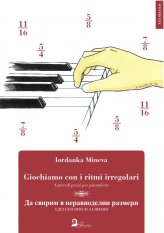Liszt understood a “rhapsody” to signify the highest degree of musical freedom: a constant process of transformation and variation of themes and motifs, all bound up with constant shifts of emotion. According to one of its early reviewers, this first of Liszt’s 19 Hungarian Rhapsodies is a prime example of “the art of thematic working such as no previous master has practised more fantastically, more expressively or more inventively”. Despite this, it was somewhat overshadowed by the greater popularity of the Second Hungarian Rhapsody (HN 803), with its considerably pithier themes and rhythms; both were published in the same year, 1851. This Henle Urtext edition, which draws on all the available sources, now provides players with an opportunity to rediscover Liszt’s First Rhapsody. Italian Liszt specialist Vincenzo Maltempo provides the fingering.
Novità, NOVITA PIANOFORTE, PF, Spartiti musica classica
LISZT Rapsodia Ungherese n.1 per pianoforte. Urtext, Henle.
€13.20
Urtext Edition, paperbound
Pages 32 (X+22), Size 23,5 x 31,0 cm
Weight 150 g
HN 1598 · ISMN 979-0-2018-1598-5
Rapsodia Ungherese n.1 per pianoforte. A cura di Jost P. Diteggiatura di Maltempo V. Urtext, Henle.
Solamente clienti che hanno effettuato l'accesso ed hanno acquistato questo prodotto possono lasciare una recensione.










Recensioni
Ancora non ci sono recensioni.